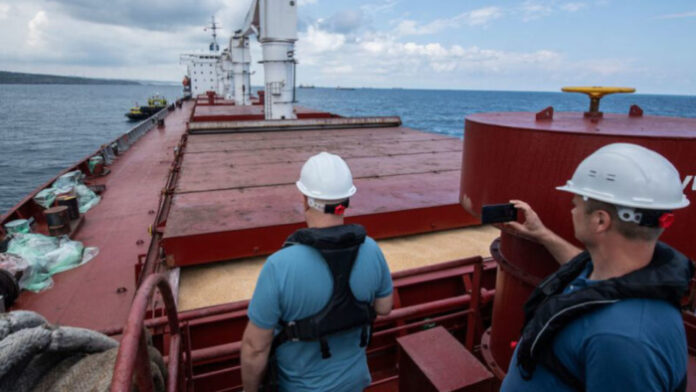
-
United Nations, Turkey and Ukraine went ahead on October 31 with the Black Sea grain exports with 16 vessels waiting to load and sail off
-
Russia suspended its role indefinitely in the humanitarian grain exports due to Ukraine’s alleged drone attacks on its navy fleet and civilian ships in Crimea
-
Ukraine and its western allies say the alleged attacks were a “false pretext” by Russia to exit the initiative and continue its “hunger game”
United Nations-led Black Sea grain exports by Ukraine went ahead on October 31, despite Russia pulling out of the Black Sea grain deal indefinitely and accusing Ukraine of carrying out drone attacks on its navy ships in Crimea.
Ships brought grain from Ukrainian ports on Monday, suggesting Moscow had stopped short of reimposing a blockade that might have caused world hunger, despite suspending its participation in a UN programme to safely export grain from the war zone, Reuters reported.
The UN, Turkey and Ukraine had said earlier they would implement the Black Sea Grain Initiative with a transit plan in place for 16 ships on Monday, according to reports.
UN Secretary-General Antonio Guterres was deeply concerned about Moscow’s move and delayed a foreign trip to try and revive the agreement that was intended to ease a global food crisis, his spokesperson was quoted by Reuters as saying.
“Civilian cargo ships can never be a military target or held hostage. The food must flow,” tweeted Amir Abdullah, the UN official who coordinates the programme, Reuters reported.
Shortly afterwards, Ukraine confirmed that 12 ships had set sail. The 354,500 tons of grain they carried was the most in a day since the programme began, suggesting a backlog was being cleared after exports were interrupted on Sunday.
The UN says more than 9.5 million tons of corn, wheat, sunflower products, barley, rapeseed, and soy have been exported since July.
A Joint Coordination Centre made up of UN, Turkish, Russian and Ukrainian officials, agrees on the movement of ships and inspects the vessels.
Turkish Defence Minister Hulusi Akar was in contact with his Russian and Ukrainian counterparts to try and salvage the agreement and had asked the parties to avoid any provocation, the Turkish defence ministry said.
NATO and the European Union have urged Russia to reconsider its decision. US President Joe Biden on Saturday called Russia’s move “purely outrageous” and said it would increase starvation. US Secretary of State Antony Blinken accused Moscow of weaponizing food.
On Sunday, Russia’s ambassador to Washington, snapped back, saying the US response was “outrageous” and made false assertions about Moscow’s move.
The Russian defense ministry said Ukraine attacked the Black Sea Fleet near Sevastopol with 16 drones early Saturday and that British navy “specialists” had helped coordinate what it called a terrorist attack. Britain denied the claim.
Ukrainian Foreign Minister Dmytro Kuleba said Moscow used the explosions 220 km away from the grain corridor as a “false pretext” for a long-intended move.
President Volodymyr Zelenskyy’s chief of staff accused Russia on Saturday of inventing attacks on its own facilities.
The grain deal had restarted shipments from Ukraine, allowing sales on world markets, targeting the pre-war level of 5 million metric tons exported from Ukraine each month.
But ahead of its November 19 expiry, Russia had said that there were serious problems with it and Ukraine complained Moscow had blocked almost 200 ships from picking up grain cargoes.




